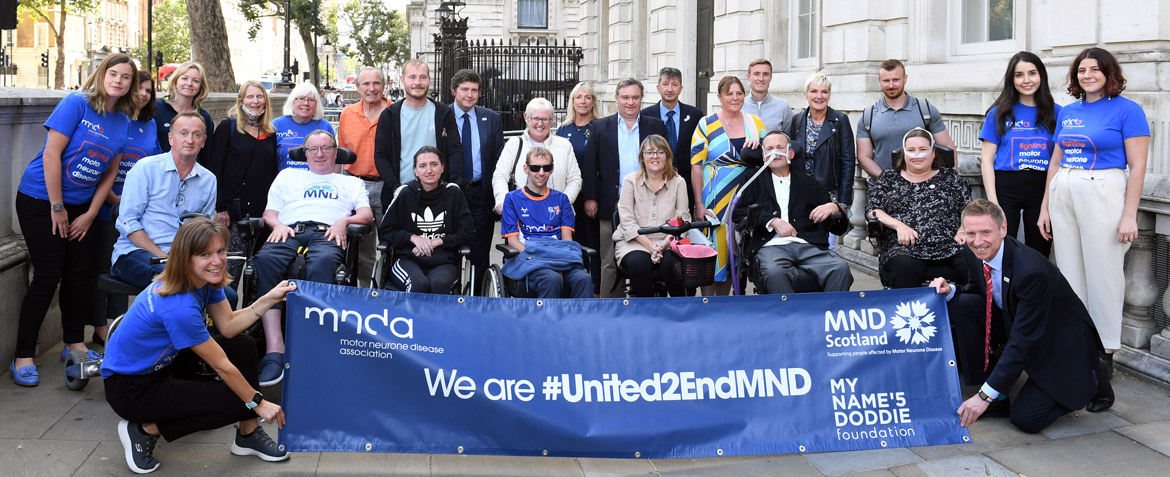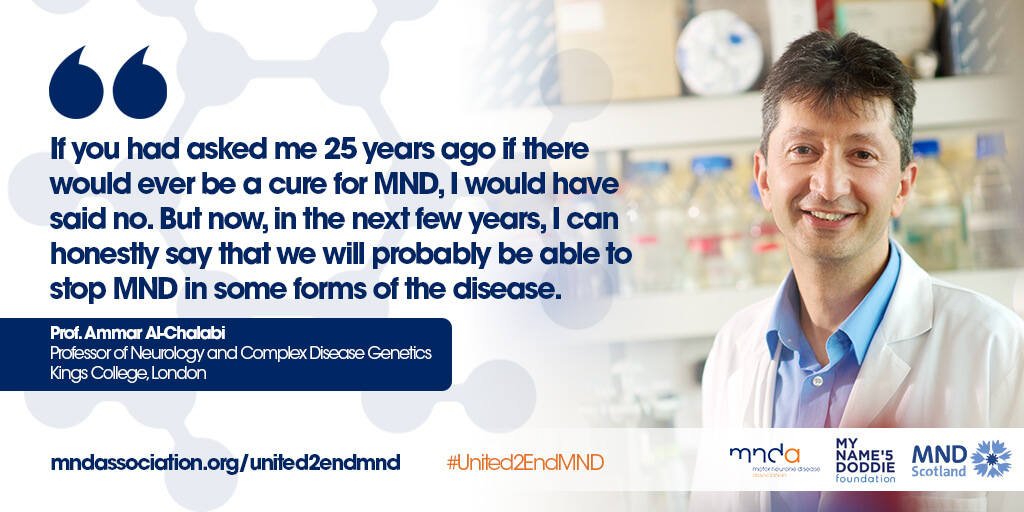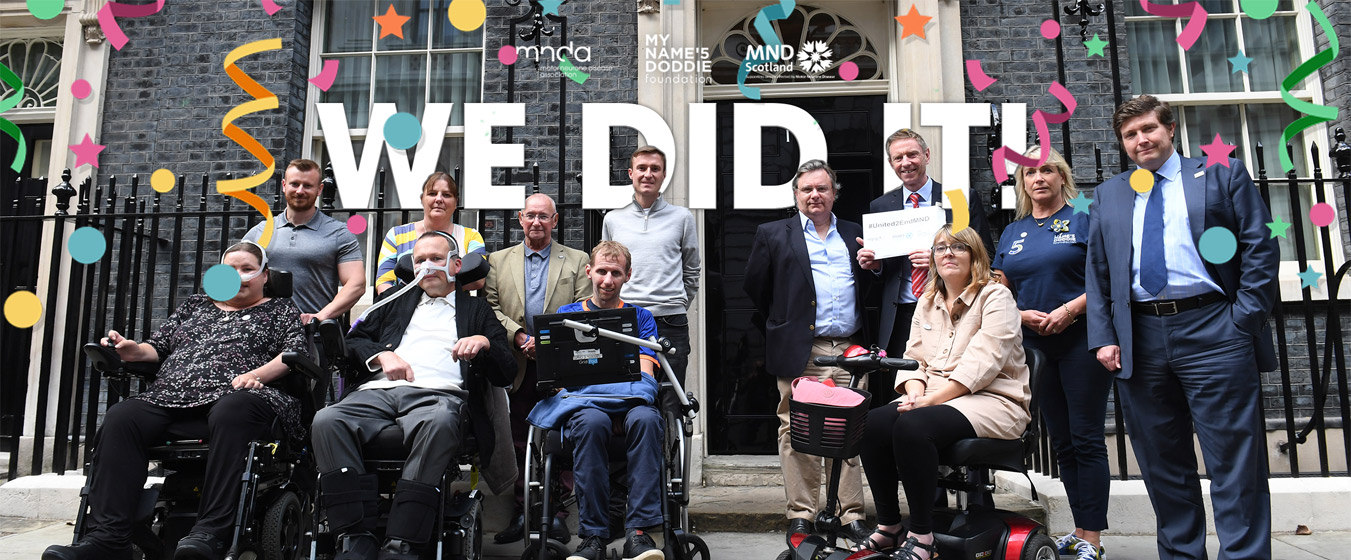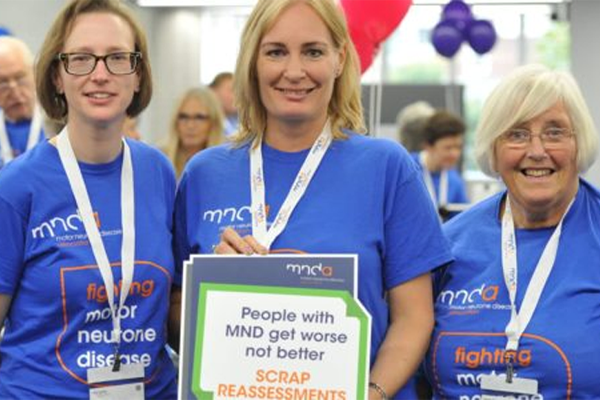November 2024 update
It’s three years since the Government announced a £50 million investment in targeted MND research, in response to the United to End MND campaign, a collaborative effort of people living with MND, UK MND charities and neurologists.
The funding has been earmarked for a number of projects and funnelled through established channels, as well as the newly-formed UK MND Research Institute.
The Government’s £50m plan
| United to End MND Partnership Coalition | £1 million |
Unified data support (through Dementia Platform UK and Health Data Research UK) | £2 million |
| Dementia Research Institute projects focused on MND | £12.5 million |
| Translational Research Accelerator (Dementia Platform UK) | £6 million |
EXPERTS-ALS (through National Institute for Health and Care Research) | £8 million |
| Medical Research Council grant funding | £20.5 million |

We are confident more than half the £50 million investment the Government pledged is in the hands of researchers. This money has kick-started key projects, processes and collaborations to drive forward progress in MND research, including enabling the launch of the new UK MND Research Institute. The funds continue to support essential work, including innovative new studies and initiatives to deliver better understanding of MND and galvanise the search for new treatments.
At the same time, the Government’s commitment to MND research has unlocked further investment from foundations, institutes and charities that will fast-track the search for meaningful drug development and trials. For instance, among the MND Association’s current £21.5 million research portfolio are co-funded projects with the potential to transform MND research in this country and worldwide.
But we’re still not at the point where we have seen the kind of breakthroughs apparent in the treatment of other diseases. We understand more than ever about the biology of MND, and are in the best place we’ve ever been to see treatments coming through the pipeline.
We now need a clear path forward to ensure the remaining £20.5 million of ring-fenced Government investment is allocated within the Government’s original five year time frame and in a way that best supports the continued growth of the collaborative MND research landscape that has emerged in the last three years. We’ve seen significant positive steps forward in that time, but that’s not good enough for a community in which half of people diagnosed with the disease die within two years. The Government has it within its gift to speed up the allocation of the remaining funding, to get it into the hands of researchers now, to fast-track the research which will ultimately save lives.
Dr Brian Dickie, Director of Research Development for the MND Association
Progress within the UK MND Research Institute
A number of projects are now up and running within the UK MND Research Institute. These were made possible by initial partnership grants totalling £4.25 million which includes the Government’s £1 million Coalition investment, and additional funding from the MND Association, My Name’5 Doddie Foundation, MND Scotland and LifeArc.
All of this money is with researchers and funding several projects:
Mobile technology helping scientists recruit patients to research and trials – the mobile digital app called Telemedicine in MND Research (TiM-R) will launch shortly.
MND Biobank – blood samples and clinical information from people with MND are creating an extensive resource available to researchers shortly to launch in four UK centres before rolling out nationwide.
Cell models – the first step to testing a drug is to test in cells. Researchers take skin cells from a patient, turn them into motor neurones, and then test the drug on those neurones. This has been done for years but each lab does it their own way – so results can be inconsistent across labs. For the first time ever globally, UK MND Research Institute researchers have developed a network of cell lines across multiple laboratories, all using the same sets of cells and protocols. That means any findings in any one lab will be a real result. The first cell lines are up and running and more are in being developed.
Progress to link genetic and clinical data
The unified data support project, which received £2 million from the Government, is already underway. The team is setting up a data management forum for the MND Register, the biggest MND register in the world, currently registering more than 10,000 people with MND. People take part anonymously, but in the second phase of the study, importantly researchers will be able to link genetic samples to anonymised clinical information, providing vital insights.
MND research progress at the UK Dementia Research Institute (DRI)
At the UK Dementia Research Institute (UK DRI), researchers are studying several neurodegenerative conditions, with many projects focused on MND. The Government’s £12.5 million has been transferred to the UK DRI. Under the MND umbrella are projects to help understand processes underpinning MND (including why individual motor neurones are affected differently in MND), and others developing new cutting edge models to test potential ways of treating MND (including stem cells).
Progress in translational research
The Government gave £6 million to Dementia Platforms UK to fund a research programme that centres around data. This encompasses a number of 18-month long projects. To receive funding, each project must use data to answer a question about MND. This funding has now been delivered to research teams.
One of the funded projects is led by Professor Ammar Al-Chalabi from Kings College London, who received funding for his ‘digital twin’ project. In this project he will develop a virtual ‘patient simulator’ which can predict a patient’s response to a drug. The team plans to predict how someone’s disease would develop without a treatment, improve the design of clinical trials in MND and reduce the need for a placebo in trials.
EXPERTS-ALS – fast tracking drugs to be tested in clinical trials
The EXPErimental medicine Route To Success (EXPERTS-ALS) programme has received £8 million from the Government.
This exciting programme - a global first led by UK doctors and scientists - will screen potential drugs for MND. This will enable researchers to identify the drugs showing the most promise to be moved into larger clinical trials, to be tested against a placebo to prove benefit beyond doubt.
The programme will measure disease progression using biomarkers – molecules that can be measured in blood samples and act as a ‘flag’ of disease activity.
The Government funding prompted a further grant of £3 million from charities, including the MND Association, to search for new biomarkers.
Much preparatory work has already been completed and EXPERTS-ALS is rapidly approaching being able to recruit participants.
MRC funding progress
Government funding being awarded via the Medical Research Council (MRC) makes up £20.5 million. This money has been awarded but researchers must apply to access it. As a result, some of the funding is in researchers’ hands already with some still available. Researchers are working collaboratively to ensure the basic science the money is invested in is coordinated.
December 2022 update
The Government, on Monday 12 December, announced it will accelerate distribution of the £50 million it pledged to invest in targeted MND research last year.
Secretary of State for Health and Social Care Steve Barclay revealed a plan to ensure £29.5 million of the funding was available for MND research in the coming months.
The below statement is from the United to End MND campaign, including people with MND, researchers and charities – MND Association, MND Scotland, My Name'5 Doddie Foundation and LifeArc.
We are pleased that Steve Barclay has listened to the MND community and now outlined how the long-awaited £50 million investment in targeted MND research funding pledged by the Government will be made available to researchers.
Our ideal scenario remains the same - to create a national MND research institute, as exists for many other diseases.
While Mr Barclay's plans stop short of that, they are a step forward and demonstrate a more streamlined approach to ensuring the funds reaching MND researchers. Although this roadmap gives us a reason to be cautiously optimistic, we would still like more clarity and to understand the detail, processes and timelines behind it. We’d welcome the chance to discuss the questions we have with Mr Barclay.
Getting to this point has taken a huge collective effort by people with MND, the MND scientific community and MND charities to impress how urgent and important dedicated MND funding is, upon the Government.
Already this coalition has resulted in money being used to kickstart work we believe is the springboard to meaningful partnerships and collaborations and the key to speeding up vital research. Now the mechanisms are in place for the Government investment to be accessed more efficiently, we expect that work to gain pace.
And, of course, the MND community don't have time to wait – over a third of people with MND die within a year of diagnosis. They need transparency, they need red tape removed, they need research to deliver treatments and ultimately a cure - fast.
United to End Coalition
While this news from the Health Secretary does not entirely simplify the process for MND researchers to access the funding, it does provide some much-needed clarity and we recognise that concessions have been made to remove some of the red tape. We appreciate this positive step forward and thank Mr Barclay for listening to the campaigners who have been urging Government to remove bureaucracy.
"Of course, our hope is that this money, in combination with continued investment from the MND Association and others, will further speed up research on the development of effective treatments for MND. What we, and the entire MND community want, is to see more of that translational research – the work that takes potential treatments from laboratories into clinics.
Dr Brian Dickie, Director of Research Development at the MND Association
In November 2021, the United to End campaign – led by people living with MND, the MND Association, MND Scotland, My Name’5 Doddie Foundation and neurologists – successfully secured a Government investment of £50 million to be targeted to MND research over the next five years.
And in a further pledge, following discussions with the coalition, the Government has agreed to direct the funding through a handful of applications each year rather than researchers having to make up to 300 applications for the £50 million which, they said, would further delay research.
We’re not stopping – of course. We will continue to work with Government to ensure every penny of the £50 million pledged is used to fund research targeted directly at MND. And we’ll be reporting regularly on the strides that are made as a result of that investment.
How did the campaign start?
The United to End MND campaign began in 2019 with people living with MND, neurologists and charities joining force for the first time. With research into MND progressing faster than ever, we all recognised that with a concerted effort treatments and, ultimately a cure, could be found in years rather than decade.
Why is the campaign so important?
Research into the causes and potential treatments for MND has progressed, with current trials offering real promise. But that progress is dependent on more research which needs investment. Funding for MND research from charities has outstripped that from Government for many years. The only way to make a real difference is to do more research, and that needs more investment.
Who was involved?
The coalition was led by people with MND, neurologists, the MND Association, MND Scotland and My Name'5 Doddie Foundation. We were joined by media outlets and thousands of people who signed petitions, lobbied their MPs and wrote letters. The success of the campaign is down to every single person’s input. Together we can beat MND.
How did the Government make the announcement?
On Sunday 14 November, then Prime Minister Boris Johnson said: “We are going to throw the full weight of government, industry and civil society behind a new British-led scientific mission to transform the fight against this devastating disease.”
Will the Government honour Mr Johnson’s pledge?
We have sought, and received, assurances from the relevant officials that the £50 million investment pot is not at risk, despite the change of leader.
What’s next?
We are continuing to work hard to ensure the £50 million from Government is targeted to research which will make a real difference. Our experts along with neurologists and the other charities are continuing to talk to the Government to ensure they deliver on their promise.
You may be interested in reading more about the work and the steps involved in this campaign, which are highlighted in the documents below.
Campaign documents
Campaign update letter (2022)
Overview briefing (2020)
Expanded brief - research audience (2021)
Spending review proposal (2021)
Proposal overview
Why a new funding model is needed

Keep in touch
To find out more about how to get involved in current and future MND Association campaigns join our Campaign Network.


